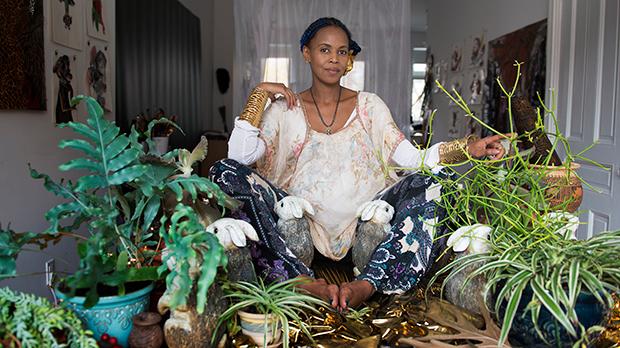Kenyan artist Wangechi Mutu takes us on a ‘Fantastic Journey’
Brooklyn-based Kenyan artist Wangechi Mutu.
Immigration issues have kept Kenyan artist Wangechi Mutu, who lives in New York, from seeing the many exhibitions of her work overseas.
But now Mutu is getting a retrospective of her work near her home, in Brooklyn. The new show reflects a body of work built since she first came to New York as a student in 1992.
The Brooklyn Museum exhibition, called “A Fantastic Journey,” is a kind of check-in moment, an opportunity to survey her preoccupations over the last 20 years, from globalization to the female body, to perceptions about Africa and more. It includes sketchbook drawings, large-format collages, and videos.
The exhibition title refers to “The Fantastic Journey,” a short-lived NBC show from 1977. It was about a family lost in a parallel universe, Mutu recalls.
“The story,” she says, “is that they’re trying to get back. But they don’t know where the boundaries are for this world that they’re trapped in.”
Mutu knows something about that feeling, thanks to her own experience with US immigration authorities.
“It was very a complicated, very difficult and very depressing situation,” she says, referring to what she considers getting caught in post-September 11 immigration “gridlock.” No longer a student, she'd been granted a new visa that recognizes immigrants with special abilities. But then, more than 10 years ago, it was revoked.
The result?
Mutu wasn’t allowed to leave the United States, at least not without giving up her immigration case. She couldn’t visit her family in Nairobi or attend international exhibitions of her work. She was stuck.
“You can go to Hawaii,” she said, adding that the state “makes you feel like you’re actually leaving, but it’s the US.”
She went to Alaska, too.
Overall, Mutu says, the experience of dealing with immigration issues is a very solitary one.
“In any country, the majority of the people are born there, they’re naturalized, they don’t have to worry about issues of ‘why are you here?’ ‘If you don’t like it, why don’t you go back?’ or ‘What do you mean your family can’t come or you can’t go?’ or whatever it is," she says.
Yet throughout her legal struggle, Mutu was hardly still.
She's always working, making art. Her immigration experience, she says, did bring into focus ideas she had long considered, about borders, boundaries and the idea of choosing to be in one place over another.
“This notion of being a transplant, of leaving your home,” she says. “Self-exiling, which is different from being an asylum case or a refugee, is a huge part of my work because I knew that there was something about Nairobi and Kenya that as a young woman wasn’t going to suffice, that wasn’t enough.”
Mutu's studio is in Brooklyn. On a bookcase, there’s a huge collection of National Geographic magazines. Her father subscribed to the magazine, so she grew up reading it. Now, the publication’s beautiful, although deeply selective, views of the world — including Africa — are core material for Mutu’s collages.
Collages of identity
You could say that Mutu has also assembled a collage of her own life: self-invention is the prerogative of the artist and the immigrant alike. But she says that’s a technique many Kenyans have adopted in the 50 short years since independence. (The formal anniversary arrives in December.)
The very nature of modern Kenya has meant patching together an ad hoc sense of national identity.
“The colonizers left us borders that didn’t make sense, that didn’t describe the nations that were previously there,” she says.
Most Americans, Mutu observes, don’t have to deal with identity challenges like this. "Home" is the US, and the US is the US and that’s that. “People tend to feel like they are in the world when they are in America and born in America. They feel like this is the world,” she added
But for America’s immigrants, home is a choice, a notion, a memory or a posture. It can be as light as your mood, or as concrete as a green card.
It’s all fertile territory for Wangechi Muti — who now, after 12 years of art and immigration lawyers, is free to travel, and free to stay.
Video: The End of eating Everything (Excerpt, 2013)
Every day, reporters and producers at The World are hard at work bringing you human-centered news from across the globe. But we can’t do it without you. We need your support to ensure we can continue this work for another year.
Make a gift today, and you’ll help us unlock a matching gift of $67,000!
